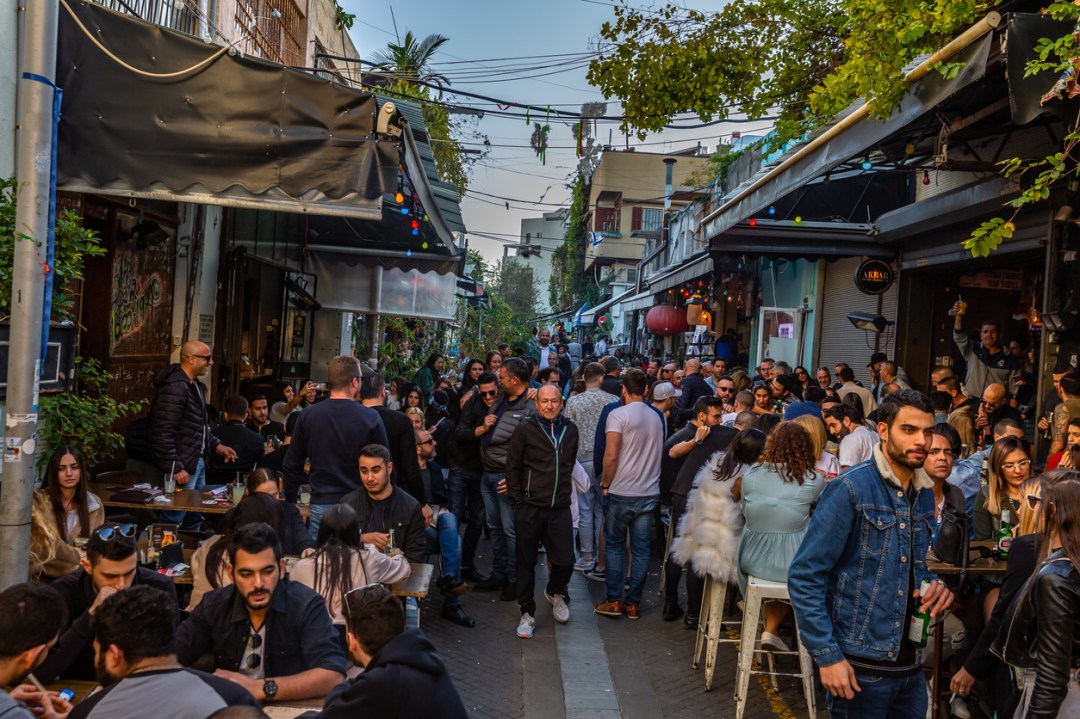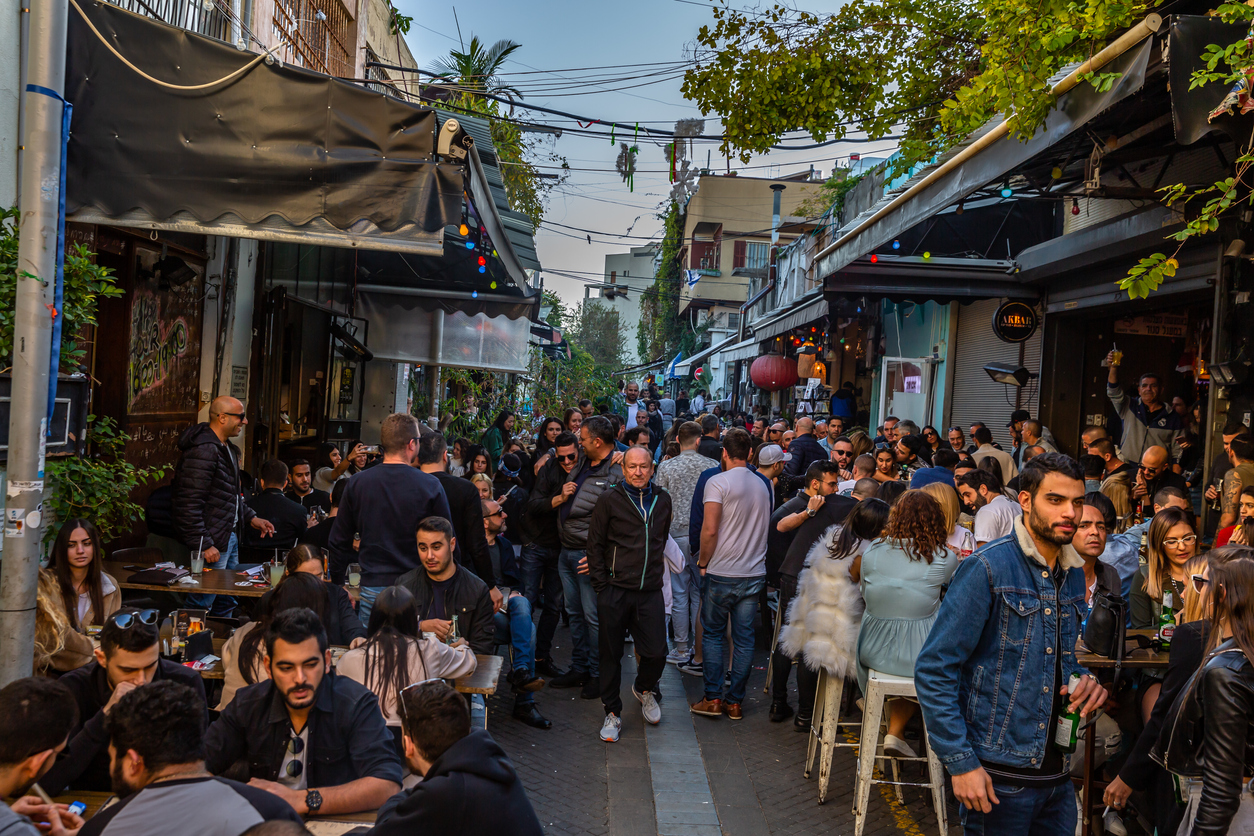Tel Aviv is the size of Bristol, with about 400,000 residents each. While Bristol has 400 pubs and bars, and just shy of a thousand restaurants, the rough concrete charm of Tel Aviv yields no fewer than 1,750 cafes, bars and clubs and more than 4,000 places to eat. Tel Aviv is a dense, hedonistic city: friendly, creative and edgy without the nasty underbelly of European cities. It is known in Israel as ‘the bubble’, secular and in its own world of sun, sea, late nights and wine, apparently separated from the problems of wider Israel.
Below the bureaucracy there are amazingly efficient relationships that seem alien to those of us used to rigid planning permission and health and safety culture
It’s not that Tel Aviv is inviolate; it has been attacked by terrorists within and without since the beginning of the Jewish state. The Iron Dome regularly intercepts rockets aimed at its homes and skyscrapers. And yet mostly the party went on. But 2023 changed that. There were protests against proposed judicial reforms, which mobilised unprecedented numbers of people, drawing them away from the revelry. And then came 7 October, piercing the bubble, sending people indoors, shaking in anguish and low with depression.
Six weeks later, people are returning to the streets and bars, albeit in a subdued fashion. On a visit last week, I went with a friend – the Israeli musician Nadav Hollander, a kind of cross between John and Paul – to his favourite bar, Nilus (the Nile). It closed for nearly a month after the Hamas attacks and on the night we visited, a Wednesday, it would normally be impossible to sit down, but we easily found a table. Sitting at the bar was Moran Alon, Nilus’s owner, a pretty 42-year-old mum and former social worker who runs the place like a salon and seems to know everyone who comes in.
Nilus is in central Tel Aviv, on Allenby Street, which is named after the British General who took Jerusalem in 1917. It’s a main road that is despised by locals – a bit like the Finchley Road or Old Kent Road in London – but Alon’s confidence in her salon vision paid off and it’s become ‘Tel Aviv’s coolest bar’, as my musician friend puts it. But in the current climate, I want to understand if there’s still a place for old Tel Aviv. What’s it like being a bar-owner – the proprietress of a place usually stuffed with merriment and peacocking – now?
Alon tells me the whole year has been hard, but in complex ways that were not apparent during the intermittent closures of Covid. In fact, just owning a business in Israel is hard; the government makes life as difficult as it can, slamming businesses with taxes, bureaucracy and disruptive construction projects without so much as a warning to the businesses that will be affected. Tel Aviv is slowly building a metro, with a leg almost abutting Nilus’s front door, which is reducing space for drinkers and creating a din that ruins the pavement terrace. While I was talking to her, the two Arab-Israelis running the construction on Allenby Street popped in to say hi at about 10 p.m. and she asked them if they could do a different bit of the street the next evening, since it was the first Thursday in six weeks that might be busy. They gave her a hug and said of course; below the bureaucracy there are amazingly efficient relationships that seem alien to those of us used to rigid planning permission and health and safety culture.
Alon tells me that the protests wiped out a lot of business. Saturdays, the day after the Sabbath when Israel reopens, have traditionally been big for drinking. But Saturday after Saturday, Tel Avivians were expected to join the anti-judicial reform marches. ‘If you don’t go to the demos you feel ashamed. It is not good to be seen sitting drinking wine.’
And since 7 October, the picture has become even more stark: ‘If you sit here with wine, there are people two streets away whose house is burned [by rocket attacks from Hamas] and his daughter is in Gaza. So sitting here drinking wine has become more complicated.’
Alon gestures to the room: ‘This is not Wednesday. This is how it looks when it is closed.’ Alon knew instantly on 7 October that she would close and, like most businesses, not reopen until it felt right (even schools, which were closed for weeks, have only reopened with half-days). She decided she would wait ‘until ten people asked me when I would open… I was very surprised, it never happened.’
I ask if this is the worst Tel Aviv has ever felt; the most unprecedented dampening of its flamboyance. By this time, we had been joined by Yotam Wax, a documentary maker, and Arie Krampf, a professor of economic history at Tel Aviv University, and all agreed that only the Yom Kippur war, when Arab states led by Syria and Egypt launched a surprise attack on Israel, was worse. Then, all windows had to be blacked out so as not to reveal signs of life to enemy pilots.
And yet having visited dozens of times over the years, I found Tel Aviv the most charming I have ever known it. It was as if tragedy had restored its famous cafe culture to the old days, where Jews sat and talked with urgency, soul and humour. There is nothing performative about their shock and misery, their identification with the remaining hostages in Gaza. But they are now airing it together outside, over coffee and, gingerly, wine too.







Comments